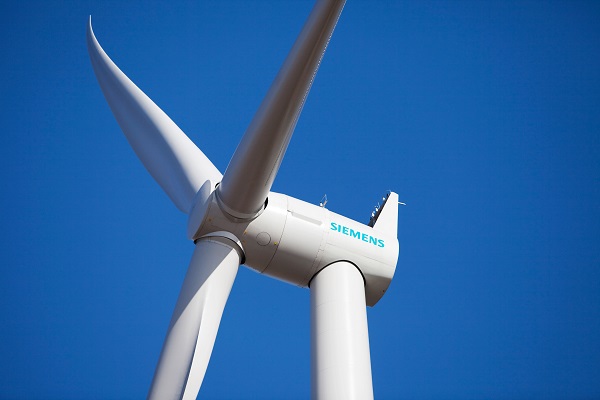Siemens has officially inaugurated the new rotor blade factory for offshore wind turbines in Hull, UK, in an event attended by the Secretary of State for Business, Energy and Industrial Strategy Greg Clark and representatives of the local community. The site at Alexandra Docks has been transformed in under two years from a derelict industrial wasteland to a busy high-tech manufacturing hub. Now, the state-of-the-art factory has completed the first 75-meter-long blades which are currently stored on racks on site. Shipping to the first offshore wind project Race Bank is expected in early 2017.
“Our new factory in Hull which we are today officially inaugurating is located in one of the most significant markets for offshore wind power and will produce rotor blades for our 7 and 8-megawatt wind turbines,” said Michael Hannibal, CEO Offshore of Siemens Wind Power. “The new manufacturing plant is part of our efforts to establish offshore wind power as a key pillar of a sustainable energy mix in Europe. At the same time we are creating 1,000 attractive jobs here and thereby supporting sustainable regeneration in the Humber region.”
With its partner Associated British Ports (ABP), Siemens is investing £310 million in Hull to create a world-class center for offshore wind manufacturing, assembly and logistics. The centerpiece of the investment, the wind turbine blade factory, is now fully operational. The full Alexandra Dock site, including a new harbor for pre-assembly and load-out of wind turbine components, will be fully on stream in 2017. Siemens had employed almost 700 people in Hull so far. A further 100 permanent staff are employed at Alexandra Dock working for Siemens’ suppliers and additional recruitment up to a total of 1,000 people will continue into 2017 as the site becomes fully operational. Hundreds more jobs have been created during construction and in the supply chain.
The new production site has an area of 540,000 square meters, including an area reclaimed from a wet dock. The new factory itself covers 40,000 square meters and has an optimized material flow based on the Siemens Production System (SPS). Storage, supply chain and assembly work are interconnected with modern database systems to produce 75–meter-long rotor blades for offshore wind turbines of the seven and eight-megawatt class.
Offshore wind manufacturing sites such as Hull in the UK or Cuxhaven in Germany are efficiently linked by new transport vessels and embedded in Siemens’ logistics concept with the goal to leverage innovation and industrialization on the way to lowering the costs of offshore wind energy. A key element of the concept is an improved transport solution, utilizing dual-purpose transport vessels to avoid both heavy component lifting through innovative Ro/Ro handling and cost intensive shipping of heavy components.
There is a growing market for wind turbines designed for erection off shore. Offshore wind power plants are currently being built primarily in the North Sea and Baltic Sea off Europe’s northern coastline. However, wind power projects are being developed in other regions as well, such as along the East Coast of the United States and in Asia off the coast of China and Taiwan.

